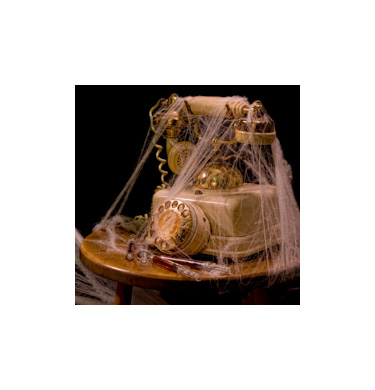


How did a restaurant review lead me to realize that rotary dial phones are defunct? Not the description of the menu, or the welcoming hipness and the proximity to neighborhoods I frequent, but a single comment about the décor. It seems that the sight of a rotary phone on a back wall brought an elderly patron to tears. He’d had a phone like that as a child.
That phone is black, I know it, even though I’ve never patronized this particular restaurant. Matte black, and startlingly heavy. In my own memory, the phone is on a table, not the wall, but the rectangular phones did hang like long faces, and the smaller square ones sat on tables like obedient pets. We had one in my college dorm room. We rented it from New England Bell. Every September, go to the phone company and rent a phone, carry it back in your lap on the T; a sign of residence, permanence, and address. This was my bell-bottoms and Frisbee era, discs flying over inert girls roasting under foil-covered reflectors on the dorm lawn. This wasn’t, in other words, ancient times. The music coming from open windows was mostly “Waiting on a Friend” from The Rolling Stones’ Tattoo You.
Those phones were all about waiting for others, and for yourself. Can I call him? Will she call me? The phone’s receiver was oddly like a small barbell, a metaphor for strength. I will wait. I will pounce. I am tethered to my disquiet.
You’re waiting for someone to call, and you wait by the phone. That same heavy black phone that when the hockey-playing guy is in your dorm room and trips over the wall cord, nearly breaks your toe. The receiver’s a hand to hold all in itself, curved, bell-shaped, and like the phone, an agreeable weight.
The suspense of waiting for a call, making a call, paying your fraction of the monthly phone bill on your measly wages from typing classmate’s papers was a part of the commitment. If you pick up the receiver while you’re waiting for a call – or listening in on a call - you’ve got to press the clear plastic pop-up buttons on the phone’s ears – they look like cat ears to me – so that the line doesn’t register as occupied. Tense, bored, trying to create magic, put your finger in one of the holes on the rotary dial and drag it clockwise until you can’t go anymore – the ‘finger stop,’ in phone parlance. Let go, hear the dial click back as many times as the number you dialed. Do it again, seven times for local numbers; the exchange (the TR6 of my childhood phone number) and the remaining four digits that, in my case, had the solid rhythmic stomp of end rhyme.
My phone number was then a location, in the sense of positioning. Number equals house, house equals solid, solid equals I am here, identified with this place. You couldn’t go far with the receiver in your hand: even the kitchen phone (the black one replaced by beige in the early seventies) would let you travel no farther than the middle of the adjacent dining room.
The rotary dial phone on the restaurant wall that made an old man weep, cousin to the one that hunkered in my dorm room, embodied apprehension and existential need. A busy signal was just that; someone is too busy to listen to you. Rejection, even if it’s unintentional, delivered in a relentless monotone. Staring at a phone and willing it to ring was a trick that never worked until luck broke your concentration and the shrill bell (silver colored, rusted, and round under the plastic housing) kick-started your senses.
It’s that sense of anticipation, of I am not-quite-there-ness, that places rotary phones in the iconography of suspense in classic film noir. Consider Barbara Stanwyck in Sorry, Wrong Number, a film named for telephones and identity. Trying to reach her husband’s office, she places a call, and mistakenly overhears killers who can’t hear her. Because of a telephone and its workings – or misworkings - she becomes the victim of literal crossed wires. The sound of a rotary dial in the opening credits, followed by the rude rasp of a busy signal guarantees portent from a mere household instrument.
The rotary phone of the sixties and seventies, not so different from that restaurant wall phone or the menacing dial beside Barbara Stanwyck’s bed, linked me to a place and held me captive to passing time. And where am I now? Somewhere with a phone as light and brightly colored as a Frisbee, harder to hold, and a hundred times more expensive. This phone displays not my number inked onto a circular white card, but a digital image of my husband and our cat. Call waiting and caller ID strangle suspense before it rears its narrative-creating head. I’m still disappointed that I know before I answer who’s calling, and I don’t always relish the ability to decide before I press a button whether I will choose to speak to them or exile them to voice mail. What romance is there in knowing the outcome before the story begins?
With no dial, and no suspended time as numbers click back from the finger stop, I am weightless, placeless.

